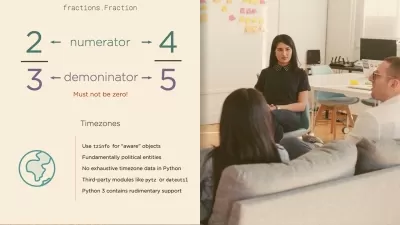6 Hours Mastering Python3
Onesinus Tamba
5:18:04
Description
Python3 practical and fundamental course
What You'll Learn?
- Python fundamental
- Syntax of Python
- Programming fundamental logics (Logical)
- Python Data types
- Operators
- Looping
- Python functions
- Built in methods
- Python OOP
- Python Iterator
- Python Decorators
- Python Generators
- Python File Management
- Python Error Handling
- Python Simple Programs
Who is this for?
What You Need to Know?
More details
DescriptionPython3, This course guides you to learn programming fundamental using python, this is for beginner level so you can make your first step to become a web programmer or a data scientist, machine learning engineer and any positions that require python as a basic requirement
NOÂ PROGRAMMINGÂ SKILLÂ ORÂ EXPERIENCE NEEDED, I try to make it as simple as it can so you can follow it step by step and enjoy the journal of learning programming (python)
Tips for you to get maximum benefits of this course:
1. I do you see (see the examples i gave to you)
2. Do it yourself (repetitive is key, try it yourself, don't only see it, practice it)
3. Explore the things outside the explanation but still on the same topic
Python is a high-level, general-purpose programming language. Its design philosophy emphasizes code readability with the use of significant indentation
Principles:
Beautiful is better than ugly.
Explicit is better than implicit.
Simple is better than complex.
Complex is better than complicated.
Flat is better than nested.
Sparse is better than dense.
Readability counts.
Special cases aren't special enough to break the rules.
Although practicality beats purity.
Errors should never pass silently.
Unless explicitly silenced.
In the face of ambiguity, refuse the temptation to guess.
There should be one-- and preferably only one --obvious way to do it.[a]
Although that way may not be obvious at first unless you're Dutch.
Now is better than never.
Although never is often better than right now.[b]
If the implementation is hard to explain, it's a bad idea.
If the implementation is easy to explain, it may be a good idea.
Namespaces are one honking great idea – let's do more of those!
I open for your feed forward, thanks for taking this course and hopefully you will be success in your learning
Thank you and Good luck!
Who this course is for:
- Everyone who wants to learn Python
- Student
- Programmer Candidate
- Programmers who want to switch programming language
- Data Analyst Candidate
- Machine Learning Engineer Candidate
Python3, This course guides you to learn programming fundamental using python, this is for beginner level so you can make your first step to become a web programmer or a data scientist, machine learning engineer and any positions that require python as a basic requirement
NOÂ PROGRAMMINGÂ SKILLÂ ORÂ EXPERIENCE NEEDED, I try to make it as simple as it can so you can follow it step by step and enjoy the journal of learning programming (python)
Tips for you to get maximum benefits of this course:
1. I do you see (see the examples i gave to you)
2. Do it yourself (repetitive is key, try it yourself, don't only see it, practice it)
3. Explore the things outside the explanation but still on the same topic
Python is a high-level, general-purpose programming language. Its design philosophy emphasizes code readability with the use of significant indentation
Principles:
Beautiful is better than ugly.
Explicit is better than implicit.
Simple is better than complex.
Complex is better than complicated.
Flat is better than nested.
Sparse is better than dense.
Readability counts.
Special cases aren't special enough to break the rules.
Although practicality beats purity.
Errors should never pass silently.
Unless explicitly silenced.
In the face of ambiguity, refuse the temptation to guess.
There should be one-- and preferably only one --obvious way to do it.[a]
Although that way may not be obvious at first unless you're Dutch.
Now is better than never.
Although never is often better than right now.[b]
If the implementation is hard to explain, it's a bad idea.
If the implementation is easy to explain, it may be a good idea.
Namespaces are one honking great idea – let's do more of those!
I open for your feed forward, thanks for taking this course and hopefully you will be success in your learning
Thank you and Good luck!
Who this course is for:
- Everyone who wants to learn Python
- Student
- Programmer Candidate
- Programmers who want to switch programming language
- Data Analyst Candidate
- Machine Learning Engineer Candidate
User Reviews
Rating
Onesinus Tamba
Instructor's Courses
Udemy
View courses Udemy- language english
- Training sessions 52
- duration 5:18:04
- Release Date 2024/03/03











